
npj Quantum Information
Scope & Guideline
Pioneering insights in interdisciplinary quantum studies.
Introduction
Aims and Scopes
- Quantum Communication and Cryptography:
Research in this area includes the development of secure quantum key distribution protocols, quantum communication networks, and methods to enhance the security and efficiency of quantum cryptography. - Quantum Computing and Algorithms:
This encompasses the design and analysis of quantum algorithms, quantum circuit architectures, and error correction methods, with a focus on practical implementations on near-term quantum devices. - Quantum Measurement and Sensing:
Studies in this domain explore advanced techniques for quantum state measurement, quantum sensing applications, and the underlying quantum mechanics that enable high-precision measurements. - Quantum Information Theory:
This involves theoretical investigations into the foundations of quantum information, including entanglement, coherence, and the capacity of quantum channels, contributing to the mathematical understanding of quantum systems. - Quantum Materials and Devices:
Research focused on the development and characterization of new quantum materials, qubits, and other devices essential for building quantum technologies, including superconducting qubits and quantum dots.
Trending and Emerging
- Quantum Networking and Entanglement Distribution:
There is a growing focus on the development of quantum networks, including methods for entanglement distribution, network protocols, and practical implementations for secure communication over long distances. - Advancements in Quantum Error Correction:
Research is increasingly centered on innovative error correction techniques, particularly for near-term quantum devices, addressing challenges such as noise and decoherence that threaten quantum computation. - Integration of Machine Learning in Quantum Systems:
The intersection of machine learning and quantum information has emerged as a significant area, with studies exploring how machine learning can enhance quantum algorithms, error mitigation, and system optimization. - Quantum Technologies for Sensing and Metrology:
There is an increasing emphasis on the application of quantum principles for high-precision sensing and metrology, aiming to leverage quantum effects to surpass classical limits in measurement accuracy. - Variational Quantum Algorithms and Optimization:
The trend towards variational algorithms, particularly for optimization problems and quantum chemistry, is gaining traction, as researchers seek efficient methods to leverage quantum computing for practical applications.
Declining or Waning
- Classical-Quantum Hybrid Systems:
Research on hybrid systems that combine classical and quantum elements has become less prominent, as the focus shifts towards more purely quantum systems and their capabilities. - Basic Quantum Mechanical Foundations:
While foundational studies in quantum mechanics were once prevalent, the current trend is moving towards applied research that translates quantum theories into practical applications, resulting in fewer publications on purely theoretical aspects. - Quantum Simulation of Simple Models:
The exploration of basic quantum systems and models for educational purposes has waned, with a greater emphasis now on complex, real-world applications and experiments that leverage the capabilities of advanced quantum technologies.
Similar Journals
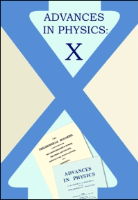
Advances in Physics-X
Fostering Innovation in Physics and AstronomyAdvances in Physics-X is a premier open-access journal published by Taylor & Francis Ltd, dedicated to advancing the frontiers of knowledge in the field of Physics and Astronomy. Since its inception in 2016, the journal has established itself as a vital platform for researchers and professionals, showcasing innovative research and cutting-edge theories that influence a broad array of sub-disciplines within physics. With an impressive impact factor and ranked in the 94th percentile among its peers, it resides in the Q1 category for Physics and Astronomy (miscellaneous), indicating its significant contributions to the academic community. Located in the United Kingdom, the journal encourages open access to foster wider dissemination and visibility of scholarly works, aligning with contemporary academic trends that prioritize global knowledge sharing. The ongoing commitment to publishing high-quality research ensures that Advances in Physics-X remains an essential resource for students, industry experts, and academics alike, helping to shape the future of physics research through collaboration and innovation.
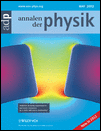
ANNALEN DER PHYSIK
Pioneering Insights in the World of PhysicsANNALEN DER PHYSIK, a prestigious journal published by WILEY-V C H VERLAG GMBH, stands as a cornerstone of the field of physics and astronomy since its inception in 1799. With an ISSN of 0003-3804 and an E-ISSN of 1521-3889, this journal provides a platform for innovative research and critical discourse across various domains of physics. Annalen der Physik is currently ranked in the Q2 category for general physics and astronomy, occupying rank #76 out of 243 in Scopus, placing it within the 68th percentile. This indicates its significant impact and the quality of research it publishes. Although the journal does not offer Open Access options, its robust historical lineage and ongoing contributions ensure that it continues to be an essential resource for researchers, professionals, and students alike. For those seeking to stay at the forefront of contemporary physics research, ANNALEN DER PHYSIK represents a vital source of knowledge, innovation, and scholarly communication.
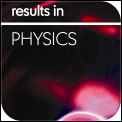
Results in Physics
Your Gateway to Cutting-Edge Physics DiscoveriesResults in Physics, an esteemed open-access journal published by ELSEVIER, has been a prominent platform for disseminating cutting-edge research in the field of physics since its establishment in 2011. With its ISSN 2211-3797 and E-ISSN 2211-3797, this journal proudly holds a Q2 ranking in the Physics and Astronomy category for 2023, showcasing its significance and quality within the scientific community. With a remarkable Scopus rank of #28 out of 243 in the general physics and astronomy domain, placing it within the 88th percentile, Results in Physics serves as a vital resource for researchers, professionals, and students alike, fostering a collaborative environment for the advancement of knowledge across various subfields. The journal aims to provide a rapid and unrestricted access to innovative findings, encouraging open scientific dialogue and enhancing the visibility of breakthrough research. Located in the Netherlands at RADARWEG 29, 1043 NX AMSTERDAM, Results in Physics continues to uphold its commitment to excellence and accessibility in the ever-evolving landscape of physics research.

QUANTUM INFORMATION & COMPUTATION
Advancing the Future of Quantum ComputingQUANTUM INFORMATION & COMPUTATION is a leading academic journal dedicated to the rapidly evolving fields of quantum information theory and quantum computing. Published by RINTON PRESS, INC, this journal serves as a pivotal platform for disseminating groundbreaking research, advancements, and theoretical insights in various domains including computational theory, mathematical physics, and high-energy physics. With its ISSN 1533-7146, the journal has established a solid reputation since its inception in 2001 and continues to engage researchers up to 2024. Despite its current standing in Q4 and Q3 quartiles across various categories, QUANTUM INFORMATION & COMPUTATION provides valuable contributions by fostering discussions on interdisciplinary applications and theories that challenge conventional paradigms. While the journal does not offer open access, it still supports a wide range of research topics, providing a vital resource for academics, professionals, and students keen on exploring the complex interplay between quantum mechanics and computation. By focusing on innovative techniques and theoretical developments, this journal is essential for anyone aiming to be at the forefront of the quantum revolution.

PRX Quantum
Fostering collaboration in the quantum landscape.PRX Quantum is a premier open-access journal published by the American Physical Society, dedicated to advancing the field of quantum studies. Launched in 2020, this journal serves as a vital platform for the dissemination of high-quality research across a diverse range of interconnected disciplines, including applied mathematics, computer science, and electronic engineering, as evidenced by its impressive rankings in the 2023 Scopus categories. With a remarkable impact factor and holding a top quartile position in multiple areas, PRX Quantum is not only pivotal for researchers engaged in quantum physics and related areas but also for professionals and students seeking to stay at the forefront of quantum technology and material science. Additionally, as an open-access journal, it champions the free distribution of knowledge, allowing for wider accessibility and engagement within the global research community. With a commitment to nurturing innovation and interdisciplinary collaboration, PRX Quantum is an indispensable resource for anyone interested in the evolving landscape of quantum science.

EPJ Quantum Technology
Fostering Collaboration in the Quantum RealmEPJ Quantum Technology is a prestigious open-access journal published by Springer, dedicated to advancing the fields of Quantum Technology, with a focus on areas such as atomic and molecular physics, condensed matter physics, and control engineering. Launched in 2014, this journal has quickly established itself as an influential platform for scholars and practitioners, achieving a remarkable Q1 ranking across multiple categories in 2023, indicative of its high impact and relevance in the scientific community. With an impressive Scopus ranking that places it in the top 15% for condensed matter physics and the top 20% for electrical and electronic engineering, EPJ Quantum Technology serves as a vital resource for researchers aiming to explore groundbreaking technologies and foster interdisciplinary collaboration. By providing unrestricted access to cutting-edge research, it plays a crucial role in disseminating knowledge that drives innovation and enhances understanding in this rapidly evolving field. Based in Germany and reaching an international audience, it is poised to impact the future of quantum science and technology significantly.

Science China-Information Sciences
Pioneering Knowledge in the Evolving Landscape of Information Sciences.Science China-Information Sciences is a prestigious academic journal published by SCIENCE PRESS, dedicated to advancing knowledge in the field of information sciences and computer science. Established in China, the journal has gained a remarkable reputation, with a 2023 category quartile ranking of Q1 in Computer Science (miscellaneous) and an impressive Scopus rank of #16 out of 232 in General Computer Science, positioning it within the 93rd percentile. The journal embraces a broad spectrum of topics, from theoretical frameworks to practical applications, providing a platform for researchers, professionals, and students to disseminate their findings and engage with the latest advancements in the field. With open access options available, Science China-Information Sciences ensures that innovative research is accessible to a global audience, fostering collaboration and interdisciplinary dialogue. The journal not only reflects the evolving landscape of information sciences but also plays a pivotal role in shaping future research directions.
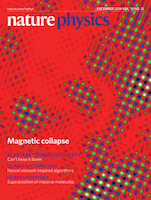
Nature Physics
Championing Excellence in Physics Research and CollaborationNature Physics is a premier journal dedicated to publishing high-impact research in the realm of physics, brought to you by the esteemed NATURE PORTFOLIO. With its ISSN 1745-2473 and E-ISSN 1745-2481, this journal has established itself as a vital resource for the physics community, enjoying a remarkable Q1 quartile ranking in the Physics and Astronomy category for 2023 and securing an impressive Rank #5/243 and a 98th percentile ranking in Scopus. Since its inception in 2005, Nature Physics has become a catalyst for innovation, featuring cutting-edge research that encompasses a broad spectrum of physics disciplines. Although it operates under traditional subscription models, it maintains a commitment to accessibility through selective publications and editorial excellence. Positioned in Berlin, Germany, this journal is a must-read for researchers, professionals, and students who seek to stay at the forefront of advancements in physics.

Quantum Information Processing
Unlocking the secrets of quantum information.Quantum Information Processing, published by Springer, stands as a pivotal journal within the rapidly evolving field of quantum computing and information science. With an ISSN of 1570-0755 and an E-ISSN of 1573-1332, this journal has been a vital resource since its inception in 2004 and is set to continue contributing until 2024. Ranked in Q2 for Electrical and Electronic Engineering, Electronic, Optical and Magnetic Materials, and various other categories, its high visibility in academic circles is reinforced by its Scopus rankings, showcasing its integral role in advancing theoretical and practical aspects of quantum technologies. Although it operates under a subscription model, Quantum Information Processing prioritizes accessibility to groundbreaking research that covers a wide spectrum of topics, including quantum algorithms, quantum cryptography, and quantum error correction, making it essential reading for researchers, professionals, and students alike. As the field grows, the journal remains committed to fostering innovation and collaboration among scholars, ensuring its position as an influential platform for sharing pivotal advancements in quantum information theory and applications.
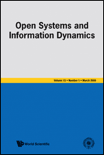
OPEN SYSTEMS & INFORMATION DYNAMICS
Innovating Research in Open Systems and Complex Dynamics.OPEN SYSTEMS & INFORMATION DYNAMICS, published by World Scientific Publishing Co Pte Ltd, is a leading international journal dedicated to advancing research in the interdisciplinary areas of computational mechanics, information systems, and mathematical physics. With its ISSN 1230-1612 and E-ISSN 1793-7191, the journal has established itself as an influential platform for disseminating original research findings, reviews, and methodologies that address complex systems and dynamics. Its current impact factor reflects a solid reputation within the academic community, particularly amongst researchers in the fields of physics, statistics, and computational sciences. The journal's scope encompasses a diverse array of subjects, earning a Q2 classification in Computational Mechanics and Q3 in multiple other categories, including Fluid Flow and Transfer Processes and Information Systems. By providing open access to a wealth of knowledge, OPEN SYSTEMS & INFORMATION DYNAMICS is committed to fostering collaboration and innovation for students, researchers, and industry professionals alike, positioning itself as a cornerstone of scientific exploration and discovery in Singapore and beyond.